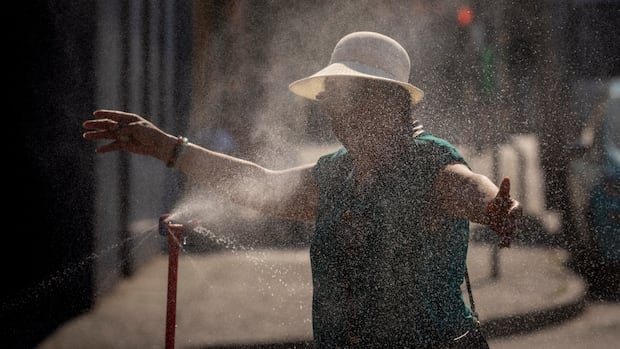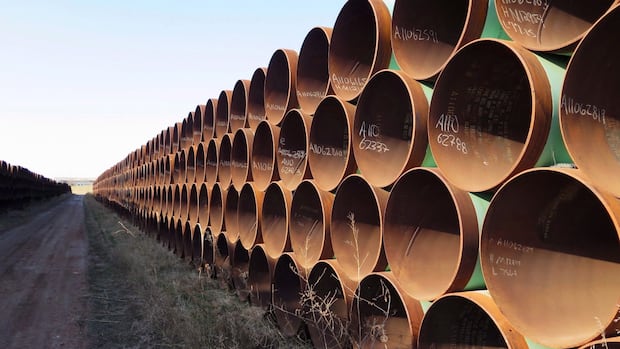The increasing role of carbon emissions in causing heat waves, floods, droughts and other extreme weather is becoming clearer, thanks to the growing field of climate attribution studies.
This research shows how much more likely — and severe — a particular weather disaster was because of climate change.
A new study by climate researchers in Europe and the U.S. and published in the journal Nature has taken this analysis further, by linking the deadliest type of disaster — heat waves — directly to major fossil fuel companies and their products.
The study looked at major heat waves that happened between 2000 and 2023, and the role of "carbon majors." These include state-owned companies (such as Gazprom in Russia or Saudi Aramco), investor-owned private companies (Shell, BP, ExxonMobil or even Canadian companies such as Suncor and Cenovus) and nation-states that produce fossil fuels such as coal (India, the former Soviet Union).
The study drew on previous research detailing the lifetime carbon emissions of these carbon majors, and other studies that show how carbon emissions make heat waves worse. They then connected those two strands to estimate how the emissions of a specific carbon major impacted the severity and likelihood of a particular heat wave.
The study found that climate change made the median intensity of heat waves globally between 2010 and 2019 about 1.68 C hotter, and 0.47 C of that was due to just 14 of the largest carbon majors.
The study goes into granular detail, with data for each one of the 180 carbon majors and their specific contribution to each of the 213 heat waves studied. The detail even shows the impact of smaller companies — for example, the smallest carbon major by emissions, a Russian coal company, made 16 heat waves more than 10,000 times likely — meaning the heat waves would have been virtually impossible without the emissions of that carbon major.
"I was surprised that even the smallest carbon majors were actually very substantially contributing to the probability of the heat waves," said Yann Quilcaille, a climate scientist at ETH Zürich, who led the study.
 A woman hands out bottled water to residents in the Downtown Eastside neighbourhood in Vancouver on June 28, 2021. (Ben Nelms/CBC)
A woman hands out bottled water to residents in the Downtown Eastside neighbourhood in Vancouver on June 28, 2021. (Ben Nelms/CBC)The research is a new frontier in assigning moral and legal responsibility for climate change to fossil fuel companies, experts say, with significant ramifications for climate litigation and advocates worldwide.
The study doesn't quantify the damage caused by each company — that depends on more factors than the intensity of a heat wave, such as emergency preparedness or the use of air conditioners. But experts say it could still be used to eventually calculate the monetary damage and the liability of specific companies.
It comes as companies and countries retool their climate policies in the wake of a U.S. administration that's reversing climate policies and promoting fossil fuels. Canada has in recent months turned away from several key climate policies, such as the consumer carbon tax and a planned electric vehicle sales mandate.
Prime Minister Mark Carney is yet to announce what will replace these policies to help Canada meet its emissions goals, but he has pushed for more resource development as a way of countering a difficult economic and trade situation.
In July, the International Court of Justice, the UN's top court, issued an advisory opinion saying countries suffering from climate disasters could seek reparations from countries emitting the most carbon and contributing to the problem. The court's ruling was seen as a precedent that people in local courts around the world could draw on as they use legal cases to spur climate action.
WATCH | What the UN's top court says about climate and countries' legal obligations:The International Court of Justice has ruled that countries that fail to take measures to protect the planet from climate change may be in violation of international law, and nations harmed by its effects could be entitled to reparations.Jessica Wentz, senior fellow at the Sabin Center for Climate Change Law at Columbia University, says this latest attribution research builds on the ICJ's opinion, and further helps people who want to sue companies — especially by establishing their standing in making a case.
"Initially when a plaintiff needs to show that they have standing in a case, they have to allege that they have an injury that is traceable to the defendant's conduct," she said. The new study will help make that link, she says, although she acknowledges there's still a long way to go until courts actually find companies financially liable.
"The methodologies that underpin these types of findings can also be used in more fungible ways to look at not only the contributions of the carbon majors, but presumably you could use a similar approach to start looking at government," Wentz said.
In Canada, two prominent cases brought by young people are making their way through the system. Both claim that government inaction on climate change is violating the rights of Canadians. A case against the Ontario government is ongoing, while a case against the federal government could be headed to a trial.
Naomi Oreskes, professor of the history of science at Harvard University, is one of the world's leading researchers on climate misinformation. She says the study could be a huge help for people affected by climate change — who may have few resources — to seek redress.
"Let's say you're a farmer and your livestock died in the [2021 North American] heat dome. You as an individual farmer don't have the capacity to prove that that heat wave was caused by climate change," she said.
"But now you don't have to because in fact, the scientists have done that work."
Oreskes called the study's findings "powerful and persuasive" at showing just how much the emissions of carbon majors have contributed to the heat problem.
"These corporations, they produce these [fossil fuel] products ... we know that they also in many cases misrepresented what they knew and they have fought policy to mitigate climate change," Oreskes said, referring to previous research from her and other experts showing major oil companies knew about the impacts of carbon emissions and the dangers of global warming decades before countries starting enacting climate policies.
"Some corporations have played a kind of leading role in producing these products that have led to this damage … I wouldn't say they bear all of the responsibility, but they certainly own the lion's share of the responsibility, and this paper is a kind of quantitative assessment of how big that lion's share actually is," she said.
CBC reached out to several carbon majors mentioned in the study, but they either declined to comment or didn't respond by publication time.













